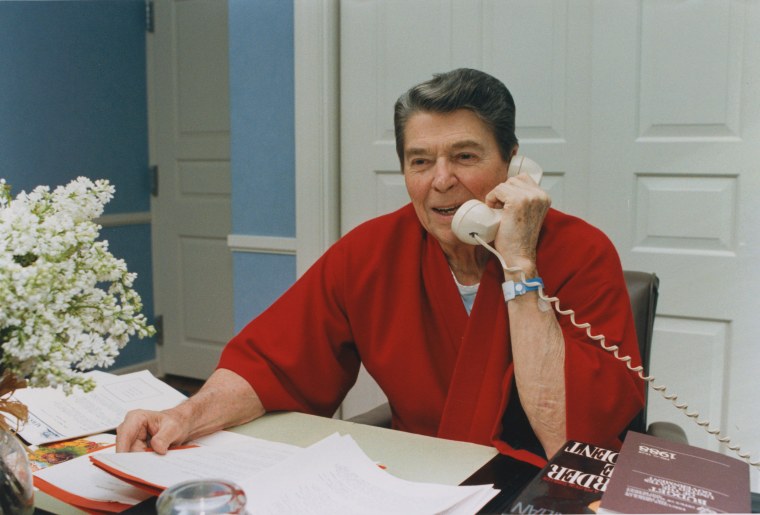The daughter of former President Ronald Reagan has recalled the terror and "state of shock" in the aftermath of her father being shot in 1981, and how the information about his condition was shared with the public by White House officials.
Author Patti Davis, 67, wrote an op-ed for the Washington Post on Sunday about the aftermath of her father's attempted assassination by John Hinckley Jr. and how the nation was informed of Reagan's condition, compared to the current contradictory reports about President Donald Trump's treatment for COVID-19.

"When you’re president, privacy is not an option — including, and maybe especially, privacy about your health," Davis wrote. "That’s a lesson my father’s administration understood, and that President Trump and his advisers still need to learn."
Watch TODAY All Day! Get the best news, information and inspiration from TODAY, all day long.
Reagan was getting into a limousine after leaving a speaking engagement at the Washington Hilton Hotel when he was hit by a bullet fired by Hinckley. The round punctured one of the president's lungs and caused internal bleeding. He spent 13 days in the hospital recovering.
Davis, who had a tumultuous relationship with her parents over the years, was 28 when her father was shot. She wrote that she had to rely on news coverage for hours to learn about her father's condition while waiting for a flight from Los Angeles to Washington, D.C.
"The country was in a state of shock, I was terrified that my father would die, the media was scrambling to put out accurate information," she wrote. "At one point, it was reported that White House press secretary James S. Brady was dead. Within minutes, that was corrected."

White House official Lyn Nofziger gave two press briefings about Reagan's condition and then had hospital administrator Dennis O'Leary deliver an update to the press after the president came out of surgery.
"This is not a story about perfection," Davis wrote. "O’Leary, who didn’t have all the information that surgeons had, misspoke about how close the bullet came to my father’s heart and neglected to say that the bullet had torn through a lung. The other mistake was made by the White House advisers in not invoking the 25th Amendment when he went under anesthesia."
Davis contrasted that chaotic time with the current updates from the White House about the condition of Trump, who was admitted to Walter Reed National Military Medical Center on Friday after revealing early that morning that he had been diagnosed with COVID-19.
Trump was also criticized by medical experts for leaving his hospital room on Sunday to be driven past a group of supporters by Secret Service agents so he could wave to his fans.
"The chaos of that day differentiates it from the current situation, when the president has contracted a virus the world has been battling for months," Davis wrote. "The mistakes that were made must be looked at through that lens. But what is important is that White House officials acknowledged and honored the fact that the American people deserved to be informed about what was happening to their president."
Davis, who told Yahoo News last year that Reagan would be "horrified" at Trump's America, called for more transparency in the reports about Trump's condition.
She wrote that Americans' trust in government is being "eroded" at "the worst possible time."
"Instead of accurate and complete information, Americans are receiving only sketchy details and evasive answers. 'It’s a common medical practice that you want to convey confidence,' White House communications director Alyssa Farah told Fox News on Sunday. This fundamentally misunderstands the challenge and the role of medical briefings: It is not to reassure either the patient or the American people, it is to provide them with clear and reliable information," Davis wrote.